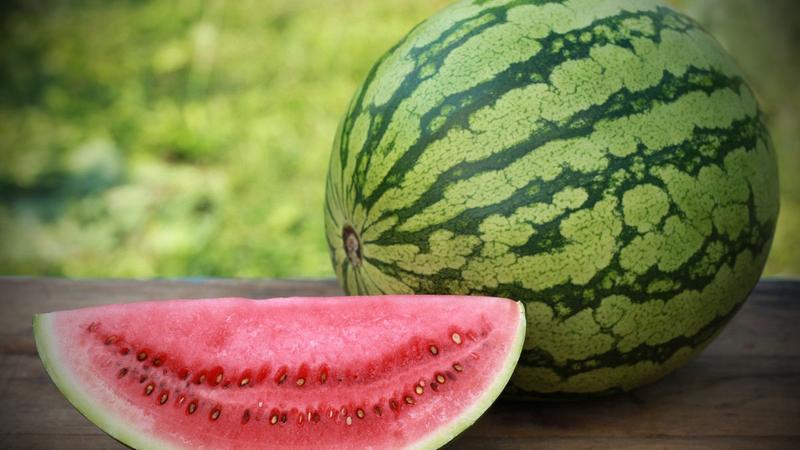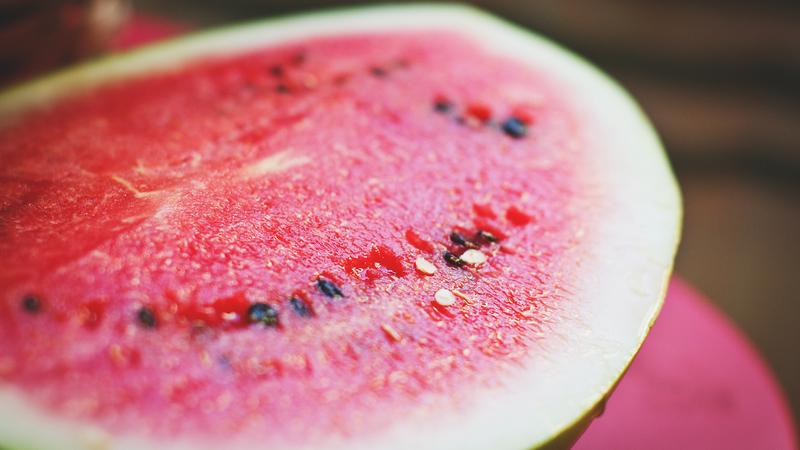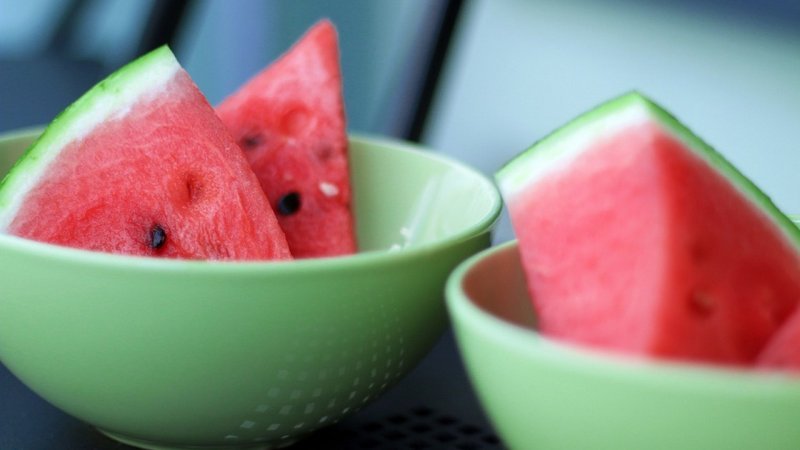Watermelon without harm to health: how much you can eat per day
Many people believe that watermelon is a product that can be consumed in unlimited quantities. However, this is not the case. This fruit has the ability to accumulate nitrates, which makes its nutritional value zero, and the risk of poisoning increases. To receive benefit from watermelons, you need to know where and how to buy them and in what quantity. In this case, all trace elements and vitamins will be assimilated without harm to health.
The content of the article
The chemical composition, calorie content and trace elements of watermelon

The presence of 18 amino acids in the composition of watermelon, almost all known vitamins, as well as important for the body minerals make it an indispensable, easily digestible product.
Low calorie content - 30 kcal - due to the following composition of BZHU per 100 g: proteins - 0.6 g, fats - 0.2 g, carbohydrates - 7.6 g. The main part is water - 91.5 g. Fiber is only 0.4 g.
Among vitamins, the largest specific gravity are: C, beta-carotene, B5, A, B6. Silicon, calcium, magnesium, potassium, sodium, iron, zinc and phosphorus act as forming minerals.
Separately, it is worth mentioning the amino acids of watermelon, which are found in food of animal origin. Their content per 100 g does not exceed 1.5%, but it contributes to a qualitative change in metabolism at the cellular level.
For example, lysine is an indispensable acid that is not synthesized in the human body. Improves the absorption of calcium and improves vascular elasticity by reducing the level of triglycerides in the blood (fatty plaques).
Threonine is needed by the body for protein synthesis. With its help, the liver is cleansed of toxins, and the skin takes on a well-groomed appearance.
The amino acid isoleucine regulates cellular metabolic processes. It is vital for people who eat abundantly fats and carbohydrates. Prevents the onset of diabetic ketoacidosis - metabolic disorders due to a lack of insulin in connection with eating fatty foods or frequent diets.
Important. The arginine in watermelon makes it especially useful for baby food. During the growth period, the child's body cannot produce this amino acid on its own. Arginine enters the child's body first with breast milk, and then with complementary foods, in particular with watermelon juice.
Watermelon is considered not only a healthy delicacy, but also an excellent option for fasting days or mono diets.
Positive properties for the human body
The use of watermelon in food has a pronounced therapeutic effect. The fruit has a diuretic and choleretic effect, strengthens the immune system, helps fight the primary symptoms of a cold: fever, inflammation.
Medicinal properties:
- laxative effect - accelerates intestinal motility;
- normalization of high pressure due to blood flow: blood vessels expand, cholesterol is removed;
- prevention of heart attacks and strokes: potassium and magnesium restore the elasticity of arteries and veins, preventing their wear and tear;
- the fight against urolithiasis: the alkaline composition of the berry destroys kidney stones and removes the products of their decay from the body without any problems;
- useful for nephritis and cystitis;
- liver cleansing: breaks down toxins, removes medication products, is effective after anesthesia and long-term treatment;
- fighting inflammation in colds: antipyretic restorative effect;
- improved tissue regeneration: promotes the synthesis of essential amino acids;
- strengthening the immune system: preventing iron deficiency anemia and vitamin deficiency;
- benefits for diabetes: simple sugars, watermelon carbohydrates, absorbed without the cost of insulin;
- restoration of water-salt balance with a hangover, swelling, acidity of the body;
- relieving headache caused by narrowed vessels.
The general effect of watermelon on the body is expressed by the composition of the berry. Vitamins A, C, E, K, together with iron, zinc and selenium, fight against premature aging of cells, blood vessels and tissues, prevent various pathogenesis (microbial action) and normalize metabolic processes in cells.

Folic acid (vitamin B9) promotes blood renewal, prevents its oversaturation with harmful compounds, which is reflected in the renewal of all organs. The high content of magnesium, potassium and sodium has a positive effect not only on the heart muscle, but also on the state of the nervous system.
Moderate consumption of watermelon dishes helps to increase stress resistance, strengthen bones and teeth. Excretory processes and digestion are normalized, which leads to a cleansing effect of the whole organism.
Calcium in a watermelon it is in a state that is easy to digest. Therefore, the product is often recommended for people with hormonal imbalances, since a lack of calcium leads to dysfunction of the glands, the secrets of which our brain recognizes.
Antioxidant Lycopene, which provides the watermelon with a red hue, prevents the development of malignant tumors. Its content in watermelon is so small that it will not harm an allergy sufferer even with a 1 kg portion, except in special cases.
Beta-carotene and B vitamins restore immunity, vision and metabolic processes, stimulate the central nervous system. Niacin (vitamin PP) promotes greater breakdown of energy from fats and carbohydrates, so watermelons are also recommended for overweight athletes.
Important. Watermelon seeds are considered healthy contents berries... Their caloric content exceeds the caloric content of pulp by more than 15 times. They are especially rich in minerals such as zinc, selenium, magnesium, potassium, iron. Recommended for men with prostate diseases and impaired sexual function. Also, the seeds of watermelon are used to prevent worms.
Possible harm and contraindications
Watermelon does not contain that fraction of trace elements that causes various side effects... The main sticking point is fluid content. For this reason, the fruit is recommended to be consumed in moderation in the morning. This warning applies to people with impaired kidney function.
The main side effect for the body is either tissue swelling or dehydration. In different people, the excretory system functions individually, therefore, both fluid stagnation and its accelerated excretion are possible.
It is recommended to take gourds with caution for various diseases of a systemic nature, especially with a chronic course.
Contraindications to use:
- increased acidity;
- diseases of the digestive system, pancreas; ulcer, gastritis during an exacerbation;
- diseases of the heart and blood vessels;
- urolithiasis, renal failure;
- diabetes, especially insipidus;
- loose stools, colic, cramps;
- allergy;
- swelling; dehydration;
- joint diseases, gout;
- prostatitis;
- late pregnancy and period of breastfeeding.
The situation is aggravated by the presence of nitrates in the fruit. Therefore, they try to eat only ripe watermelons harvested in the fall or grown with their own hands. A healthy fruit has a bright saturated color of the pulp with a visible porous structure (the pulp is not candied), without yellow veins on the rind and white ones on the pulp, which indicates an excessive content of nitrogen components and nitrates.
Important. The main problem of watermelons is the content of nitrates, which have a particularly negative effect on the child's body. It is impossible to measure the exact content of a substance in the pulp, which casts doubt on the usefulness of such a product in baby food. Preference is given to whole uncut watermelons (4-6 kg), which have quality certificates with inspection results and bought in organized places.
Consumption rate without harm to health
There is a lot of controversy among nutritionists about the norms of consumption of watermelon, which speaks of individual susceptibility to the pulp of the fruit, which is learned by trial and error. Some doctors attribute watermelon diets for 3-4 days with a consumption rate of up to 2-2.5 kg.
As for the average person, on average he eats 2-3 slices (400-600 g) at a time. A person with a sufficiently balanced diet is not able to eat a large amount of hearty pulp. However, even 1 kg of the product will not have a significant effect on a healthy body.
Pregnant and lactating mothers are allowed 2-3 medium slices per day. Small children from 6 years old - 200-400 g. No more than 50 g of watermelon (1-2 g), 100 g (2-3 g), 150 g (3-4 g) are allowed in the quality of complementary foods.

Sick people are prescribed special diets: they should find out from the doctors in advance what rate of watermelon consumption is allowed for them. Most often, this is 1-2 slices a day, which will not have a pronounced side effect.
Watermelon should be used with caution for people trying to lose extra pounds with the help of watermelon pulp. Watermelon diets are popular and recommended by many nutritionists, but require a competent approach.
On the one hand, if you eat 3-4 kg of watermelon per day, you can almost completely cover the deficiency of essential microelements and vitamins. On the other hand, an excessive diuretic effect will lead to washout. Therefore, diets are calculated for a maximum of a week and only for people with a healthy genitourinary system. As restrictions, any foods with a high carbohydrate and fat content are prohibited.
Important. Use the watermelon as an aperitif for 20-30 minutes. before the main meal, preferably lunch. Sliced watermelon is also suitable for lunch and afternoon tea. For a portion per person, take 200-300 g of watermelon.
What happens if you overeat watermelon
Despite the relative harmlessness of the fetus in dietary terms, it can cause unwanted symptoms and side effects.
Characteristic signs of overeating:
- bloating, colic and diarrhea;
- frequent urination;
- nausea, heaviness in the stomach;
- drowsiness, weakness;
- increased appetite, bouts of hunger;
- kidney failure (if you have a serious illness).
In case of poisoning with nitrates from the pulp, symptoms are expressed by headache, dizziness, nausea, weakness, sometimes vomiting, sharp pain in the stomach and fever. In this case, be sure to wash the stomach and call an ambulance.
In order to possibly prevent poisoning, the pulp from the core is eaten, since nitrates are collected in greater concentration at the stalk and under the skin (2-4 cm).
Conclusion
Watermelon is an excellent remedy for healing the body and maintaining immunity. However, consuming the product requires a reasonable approach. Its reception for people with diseases of internal organs is limited, but not prohibited. But the use of the fetus for food by children should be limited due to the possible content of nitrates in unknown dosages. Therefore, even adults are advised to adhere to certain norms.